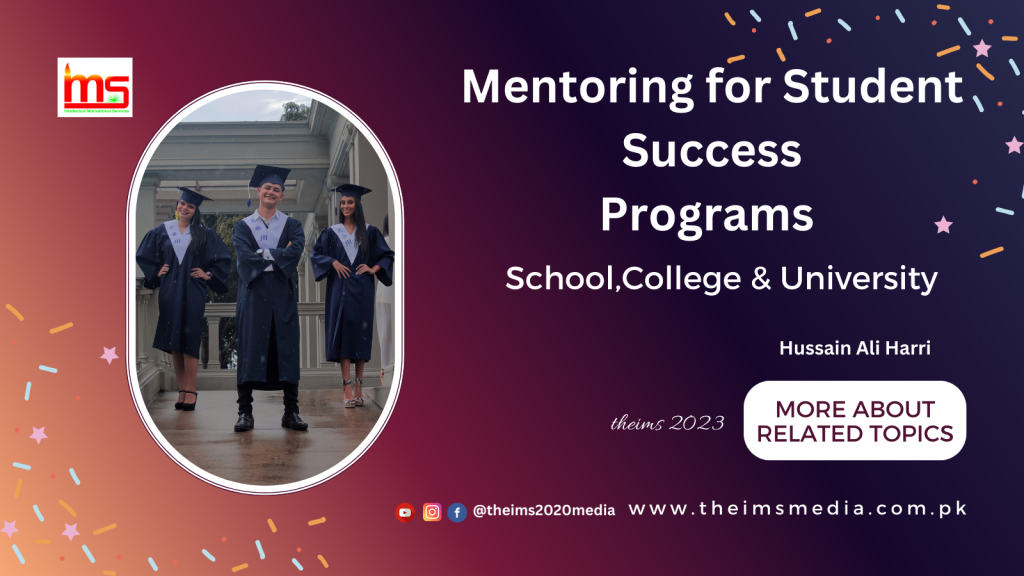
Mentoring for Student Success
Programs
Prepared by: Hussain Ali Harri
Mentoring students to thrive in a holistic work environment is crucial for their overall well-being and academic development.
Effective training programs play a vital role in providing students with valuable experiences and nurturing their critical thinking skills.
However, many educational institutions face challenges in offering comprehensive mentorship programs, which can lead to some students being overlooked. In this article, we will explore practical ways schools can support and empower these students to achieve long-term success.
Exploring Mentorship Strategies
Schools have various avenues through which they can support and guide mentored students. Some commonly utilized approaches include:
Fostering Mentor Relationships
Educating instructors about their student’s unique abilities and interests is essential in helping them reach their full potential. By focusing on ongoing instruction and problem-solving, educators can also provide mentorship through podcasts, multimedia presentations, interactive activities, and tailored lesson plans.
Building Meaningful Connections
Mentorship programs can offer valuable support by focusing on establishing meaningful relationships with students and providing them with diverse perspectives. Active listening and access to resources such as books, journals, and professional development materials are key components of successful mentoring, as exemplified by programs like Duolingo.
Implementing Customized Support
Maintaining a student’s holistic well-being through mentorship can be challenging. Schools can facilitate this process by creating online platforms where teachers can offer guidance to address student concerns, ensuring that teacher-student communication receives the required attention.
Establishing Supportive Environments
While schools cannot prevent all mental health issues, they can create safe and welcoming environments that encourage active involvement from parents and caregivers. These environments must fill the gaps left by traditional healthcare systems and provide ample support for students.
Employing Engaging Strategies
Utilizing techniques such as gamification and sharing relevant news related to mentoring work can significantly enhance student engagement and retention. Schools can establish platforms for parents to connect through shared interests and open lines of communication. However, it is crucial to ensure that the sharing of personal thoughts is voluntary and comes with appropriate warnings.
Illustrating Mentorship Initiatives
In addition to the aforementioned strategies, schools can utilize mentorship training programs within their institutions. These programs allow teachers to focus solely on teaching and provide mentoring services to students, ultimately enhancing academic achievement and nurturing students’ potential through participation in seminars and conferences.
Conclusion
In conclusion, comprehensive mentorship programs offer numerous benefits, including increased student engagement, improved academic performance, the development of strong relationships, and the promotion of gasification and relevant news.
School administrators can work towards implementing these strategies by developing new training programs, incorporating mentorship initiatives, and fostering robust mentorship programs to ensure that every student receives a well-rounded education.


Heya! for the first time here. I came across this board and I find It truly useful & it helped me out much. I hope to give something back and aid others like you helped me.
Thank you for visiting our website, studying our article, and sharing valuable advice. will encourage us so that we can continue our academic journey. Thank you
I just like the helpful information you provide in your articles
Thank you for your interest and valuable advice. We hope you will continue to share your insights and feedback as we move forward with our research. Since our articles are based on thorough research and verified facts, the publishing process can take some time. To stay updated, we invite you to subscribe to our blog newsletter, so you’ll receive our latest posts as soon as they’re available. For further information or guidance, feel free to reach out to us via our official email.
theims.media@gmail.com
Thank you!
Thank you for writing this post. I like the subject too.
Thank you for your interest and valuable advice. We hope you will continue to share your insights and feedback as we move forward with our research. Since our articles are based on thorough research and verified facts, the publishing process can take some time. To stay updated, we invite you to subscribe to our blog newsletter, so you’ll receive our latest posts as soon as they’re available. For further information or guidance, feel free to reach out to us via our official email.
theims.media@gmail.com
Thank you!
An fascinating dialogue is price comment. I feel that it’s best to write more on this matter, it won’t be a taboo topic but usually individuals are not enough to speak on such topics. To the next. Cheers
Indeed, engaging in a fascinating dialogue can be incredibly valuable. It’s true that certain topics often remain unspoken due to societal norms or discomfort, yet discussing them can lead to greater understanding and enlightenment. By encouraging open conversations, we create a space where diverse perspectives can be shared, fostering growth and empathy. I completely agree that more discussions on these subjects are needed, and I look forward to continuing this dialogue. Cheers to that!
Hey there, You have done an incredible job. I’ll certainly digg it and personally recommend to my friends. I’m confident they will be benefited from this site.
Dear readers, we are delighted to have you on our website. Your visit is warmly welcomed. We appreciate your encouragement and positive feedback, and we hope you will continue to support us in this manner. Thank you.